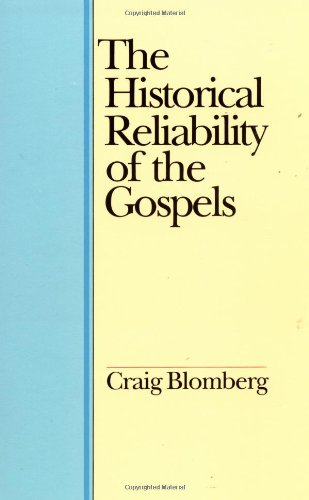Book review: The Historical Reliability of the Gospels
by Craig Blomberg
★★★★
In an era when it’s trendy to question everything written in the Bible, here’s a scholarly exception. Blomberg is a conservative who isn’t content to found his faith on faith alone. After a run-down of the latest methods of Biblical analysis, he tackles three primary “problems” for scholarly believers:
[1] Miracles, and the problem of credibility. This may be Blomberg’s weakest argument, where he is reduced to concluding that if the resurrection really happened, then surely none of the other stories are that incredible!
[2] Contradictions within the three Synoptic Gospels. Perfect harmonization is an unreasonable expectation, and even if errors do exist (Blomberg does not admit to any, but confesses the possibility) then that may explain some of the apparent contradictions.
[3] The problem of John’s Gospel. What are we to make of this maverick writing? It seems to argue against the Synoptics at every turn, and repeatedly insists upon eyewitness testimony. Blomberg’s take (which I’m oversimplifying) is basically, “Let John be John;” the apparent contradictions are not severe enough to discredit either John or the Synoptics.
Blomberg then discusses the Jesus tradition outside the Gospels. What do the remaining books in the New Testament say about Jesus? What do the extra-canonical writings say? What do non-Christians say? He concludes that they reinforce the Gospel story.
So are the Gospels reliable history? Some Christians would affirm this merely because their doctrine of the inspiration of scripture requires them to, but Blomberg believes the Gospel story can stand on its own. He finds it neither a slam-dunk for or against historical reliability, but rather a topic deserving of serious scholarship, and certainly not a barrier to conservative Christian faith.












 354 Circles
354 Circles
 603 Goodreads Friends & Fans
603 Goodreads Friends & Fans

 Hello! I'm an author, historical Jesus scholar, book reviewer, and liberal Christian, which means I appreciate and attempt to exercise the humanitarian teachings of Jesus without getting hung up on any particular supernatural or religious beliefs.
The Bible is a magnificent book that has inspired and spiritually fed generations for thousands of years, and each new century seems to bring a deeper understanding of life’s purpose. This is true of not only Christianity; through the years, our age-old religions are slowly transforming from superstitious rituals into humanitarian philosophies. In short, we are growing up, and I am thrilled to be riding the wave.
I avidly read all thought-provoking religion titles. New authors: I'd love to read and review your book!
Hello! I'm an author, historical Jesus scholar, book reviewer, and liberal Christian, which means I appreciate and attempt to exercise the humanitarian teachings of Jesus without getting hung up on any particular supernatural or religious beliefs.
The Bible is a magnificent book that has inspired and spiritually fed generations for thousands of years, and each new century seems to bring a deeper understanding of life’s purpose. This is true of not only Christianity; through the years, our age-old religions are slowly transforming from superstitious rituals into humanitarian philosophies. In short, we are growing up, and I am thrilled to be riding the wave.
I avidly read all thought-provoking religion titles. New authors: I'd love to read and review your book!
 Hi! While Lee writes the articles and reviews the books, I edit, organize, and maintain the blog. The views expressed here are Lee's but I'm his biggest supporter! :-)
Hi! While Lee writes the articles and reviews the books, I edit, organize, and maintain the blog. The views expressed here are Lee's but I'm his biggest supporter! :-)
Connect With Me!